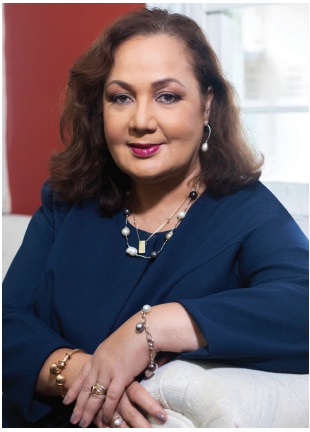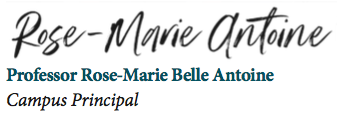On March 12, 2024, UWI St Augustine held its annual Campus Council meeting (see article in this issue). At the meeting, Campus Principal Professor Rose-Marie Belle Antoine presented her review, which is also included in The UWI St Augustine 2022/2023 annual report. UWI TODAY is pleased to share the review below.
For the full annual report, visit https://sta.uwi.edu/news/reports/default.asp.

The 2022/2023 academic year saw the St Augustine Campus fully resume face-to-face operations post-pandemic. It was also the first year of implementing Phase II of The UWI’s 2022–2027 strategic plan, the Revenue Revolution, which coincided with my first year as Campus Principal.
All of these were important changes, but when I spoke about change at my Induction Ceremony in January 2023, I was also focused on three elements: change to save our environment; change to make our society more equitable and inclusive; and change for the survival and sustainability of the St Augustine campus. The first two I view as critical for the continued survival and development of our people and planet, and the third is critical to the survival and development of our campus and university. As you read this report, you will see we have made important progress in these areas. You will also find that, as our theme suggests, responsibility for that progress is spread across disciplines, in both academic and administrative arms, and often involved partnerships with public and private sector organisations. We must create change together.
Our commitment to addressing environmental issues through our work and to increasing our own environmental stewardship remains unwavering. Projects undertaken in the reporting year vary widely and showcase cutting-edge research, fuelling development, our core mission. Some highlights include the establishment of a pollinator garden which is to be replicated across the country; the reformulation of sargassum seaweed into eco-friendly organic pesticides; unlocking carbon capture in Trinidad & Tobago by developing a National Carbon Dioxide Storage Atlas for Trinidad & Tobago in partnership with the Ministry of Energy & Energy Industries, BPTT, Shell and the University of Trinidad & Tobago; the creation of “green pesticides”, which saw our staff working directly in the field with farmers; and a collaboration with the Ministry of Planning & Development to mitigate the effect of flooding on already vulnerable communities and ecosystems around the South Oropouche River Basin. No doubt this project will someday benefit from another that was set in motion during the review period – the establishment of a Mexico-funded Geospatial Monitoring Station that will provide data for decision-making related to agriculture, combatting climate change, disaster reduction, and other areas.
Of course, these are just the projects undertaken during the review year. Many more are in train, such as additional electric vehicle charging stations that will serve the campus community and provide additional opportunities for research.
To provide the public with a broader overview of the campus’ contribution to important environmental and climate-related matters, we launched a series of weekly articles in the Trinidad and Tobago Newsday. The full breadth of our research, however, could be seen in our revived and revamped column in the Daily Express, in our flagship paper, UWI TODAY, published each month in the Sunday Guardian, and splashed across our social media pages online, as we sought to incentivise research and take it to the people.
Significant strides have been made in advancing social change that is both equitable and inclusive. In partnership with the Ministry of Youth Development & National Service, we trained scores of young people in farming and entrepreneurship, opening doors to sustainable self-employment and higher education, should they so choose. We have not only advocated for disability rights but are empowering our students to advocate for themselves, and on an issue close to my heart, we have stood with the First Peoples of the Caribbean, amplifying their calls for justice and equal recognition. Additionally, we continued to take our work on gender and social issues into the community by hosting gender-based violence workshops for youth across the country.
Finally, we are pleased to report on the many initiatives that were undertaken to improve the student experience, to create a more responsive and inclusive atmosphere for staff, and to create a sustainable and more self-sufficient campus. I have held staff listening sessions, and although work is still in progress, strides are being made to foster an improved campus team. I initiated funding for an after-school care centre to assist with care duties, and I hold weekly staff open hours. Taking on board feedback from students, we have digitalised many services for a faster turnaround time in various application processes. To enhance our customer service experience and improve efficiency, we provided training for a number of staff and managers throughout the campus at various levels.
To better facilitate our revenue revolution goals, we set up a campus implementation committee in which we explore, examine and support potentially profitable projects from our ever-expanding campus innovation ecosystem. Even as the International Fine Cocoa Innovation Centre provides training, meeting spaces, and production facilities for start-ups, it is also poised to take the next step and enter the international fine chocolate market. During the reporting period, the foundation was laid for the successful completion of our new Chocolate Factory. This venture takes advantage of the decades of research conducted by our Cocoa Research Centre as stewards of the world's largest Cocoa Genebank.
As I close, I acknowledge, with sincere thanks, the many stakeholders and interest groups who took time from their busy schedules to meet with me and my team to discuss areas of mutual interest – in particular, the President of the Co-operative Republic of Guyana, His Excellency Dr Irfaan Ali, who shared his vision for the development of his country and the areas in which The UWI may support; and members of the business community, such as the ANSA McAL Group. I thank too those individuals and companies that continue to stand by us despite the economic challenges, such as Republic Bank Ltd which sponsors our World of Work programme, and the Guardian Group of Companies that celebrates our excellence in teaching through its Awards. I also thank the Government of the Republic of Trinidad & Tobago for its support and for trusting us as a development partner.
We aim to continue this momentum as we move forward, creating impactful change for a better future. Your support and dedication are vital in this journey. Please reach out to us with your ideas on how we can partner with you, your business or community, to make a direct and positive impact. We look forward to hearing from you!
